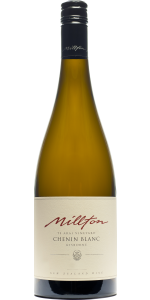
Description
The Te Arai vineyard is five kilometres from the sea. “Te Arai” roughly translates to “the place where you pause before going on toward the land of eternal sunshine.” Quite appropriate for this wine, I thought. This maritime proximity underlies the wine’s unique South Pacific style. The silt soils give fragrance while the occasional incidence of botrytis, generated by the autumnal mists from the Te Arai stream, give complex texture, body and a sense of sweetness to the wine. In the Loire Valley of France, Chenin Blanc produces powerful wines of a similar character, which we refer to as our touchstone. Winemaker Notes: Over the years our determination to produce one of the world’s best wines from this variety is a seasonal challenge and a bottled fantasy. Up to four selections are made in the vineyard when we hand harvest the grapes. On the crush pad the stems are discarded as these grapes give up their juice very easily during the long slow press cycle. The juice is collected together and allowed to settle for only a short time as we need to keep the fine sediments, for it is here that all the nutrients lie which satisfy a well behaved fermentation. The fermentation and maturation take place in demi-muids (large 600 litre oak barrels) and stainless steel tanks. The wine matures in these vessels over time, and without the obtrusion of oak tannins, which would otherwise disrespect the subtle fruit aromas. With aromas of fresh lime zest and fragrant gardenias, this wine is taut and vibrant in a way that will show its’ maturity over a very long time. Flavours of fine wool and bush honey are enhanced by quince and ripe bouche pear aromas with a tingling aftertaste. Serve about 12ºC and allow to breathe for as long as you think best. Ageing potential is at least 10 years from date of release.
BioGro Certified Organic Demeter Certified Biodynamic Grown and Bottled on the Property Dry Farmed Carbon Negative
Total acidity: 7.50g/l pH: 3.33 Alcohol: 12.5% Vol Residual Sugar: 6.2g/l Harvested on: 15th April 2015 Bottled on: 2nd November 2015 Released on: 1st February 2016
Certifications
Alcohol
12.0%
Analytical data
dry
Vineyard
Te Arai Vineyard was originally a bull paddock and later a citrus nursery. Thie block was planted in 1984 and it also houses the winery, offices, gardens and Annie and James' home. It sits right on the riverbank bounded on three sides by the Te Arai River, which originates way back in the hills of the Waingake Valley. Through the ages this river has cut a deep rut in the land that makes up the valley floor. A rut so deep that, in former times, it proved to be impassable. The Te Arai vineyard is five kilometres from the sea. “Te Arai” roughly translates to “the place where you pause before going on toward the land of eternal sunshine.” Tuhoe Maori from Lake Waikaremoana camped on this land whilst they awaited permission to cross the river and trade seafood for wood pigeons with local tribes on the coast. A sacred piece of ground. Te Arai vineyard is planted with Chenin Blanc, Malbec and a small parcel of Muscat. Through the middle of this vineyard, and in keeping with the diversity theme, James planted a nature habitat of gravilleas and bottle brush trees, wanting to attract the native birds including bellbird and tui, both nectar-eating birds and very territorial, therefore tending to scare off other fruit-eating birds. Bees are also attracted to these beautiful red flowers and it is also where they house the beehives.
Vinification
Over the years our determination to produce one of the world’s best wines from this variety is a seasonal challenge and a bottled fantasy. Up to four selections are made in the vineyard when we hand harvest the grapes. On the crush pad the stems are discarded as these grapes give up their juice very easily during the long slow press cycle. The juice is collected together and allowed to settle for only a short time as we need to keep the fine sediments, for it is here that all the nutrients lie which satisfy a well behaved fermentation. The fermentation and maturation take place in demi-muids (large 600 litre oak barrels) and stainless steel tanks. The wine matures in these vessels over time, and without the obtrusion of oak tannins, which would otherwise disrespect the subtle fruit aromas.


